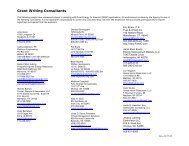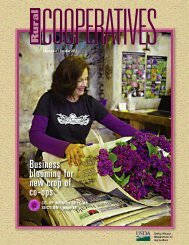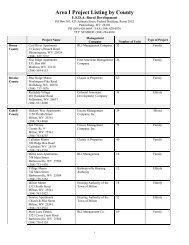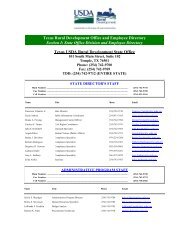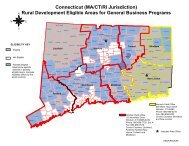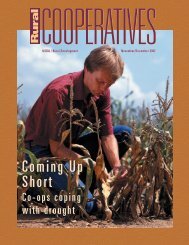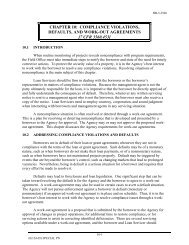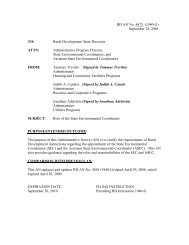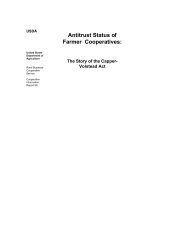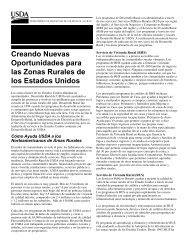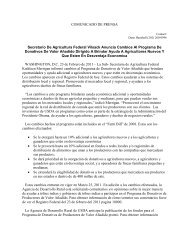How bike co-op went off track - USDA Rural Development - US ...
How bike co-op went off track - USDA Rural Development - US ...
How bike co-op went off track - USDA Rural Development - US ...
Create successful ePaper yourself
Turn your PDF publications into a flip-book with our unique Google optimized e-Paper software.
M A N A G E M E N T T I P<br />
Imperfect Directors & CEOs<br />
New book focuses on seven disciplines of business governance excellence<br />
Bruce J. Reynolds, Ag E<strong>co</strong>nomist<br />
<strong><strong>US</strong>DA</strong> <strong>Rural</strong> Devel<strong>op</strong>ment<br />
Editor’s note: Made a move at the managerial<br />
or director level at your <strong>co</strong>-<strong>op</strong> that you<br />
think would be of interest to other <strong>co</strong>-<strong>op</strong><br />
managers and directors? If so, please <strong>co</strong>ntact<br />
the editor at: dan.campbell@wdc.usda.gov.<br />
here is no shortage of<br />
T<br />
“how-to” books and articles<br />
about improving<br />
organizations and leadership.<br />
This genre typically<br />
provides fairly similar sets of re<strong>co</strong>mmended<br />
best-practices to follow. Of<br />
<strong>co</strong>urse, learning to recite best-practice<br />
disciplines is one thing, but a genuine<br />
understanding needed for their effective<br />
application is another matter entirely.<br />
A <strong>co</strong>ntext for visualizing how this or<br />
that discipline would work helps build<br />
genuine understanding. Short of direct<br />
experience applying management disciplines,<br />
the closest approximation is to<br />
read situational scenarios and case studies.<br />
Jim Brown — a founding partner of<br />
Strive!, a leadership devel<strong>op</strong>ment firm<br />
specializing in governance issues — has<br />
written The Imperfect Board Member:<br />
Dis<strong>co</strong>vering the Seven Disciplines of<br />
Governance Excellence, which provides an<br />
illuminating look at his subject and<br />
gives vitality to his set of best-practices<br />
for board members and management.<br />
While using a story to demonstrate<br />
best-practices, the author also provides<br />
summary tables of key points and diagrams<br />
to illustrate interactive processes.<br />
But if a reader were to skip the scenarios<br />
and just read through the lists of<br />
summary points and glance at the diagrams,<br />
the lack of <strong>co</strong>ntext would greatly<br />
reduce the likelihood that the book will<br />
make a real impact.<br />
Furthermore, the situational scenarios<br />
<strong>co</strong>ntain insights that are not listed in<br />
summary tables. A few of these insights<br />
are discussed below, particularly some<br />
points with special relevance for <strong>co</strong><strong>op</strong>eratives.<br />
The <strong>co</strong>mplete list of key points<br />
and the seven disciplines is not re-stated<br />
here, but should prove of interest for<br />
<strong>co</strong>-<strong>op</strong> leaders and others who read the<br />
book.<br />
The Imperfect CEO ought to be<br />
added to the title, because the CEO is<br />
also part of these stories and is involved<br />
in much of the book’s wisdom about<br />
superior governance. Even an excellent<br />
board can perform poorly if its interactions<br />
with the CEO are strained.<br />
The book provides insightful parallels<br />
between the boards of a for-profit<br />
<strong>co</strong>rporation and a citizen group that<br />
directs the work of a <strong>co</strong>mmunity parks<br />
and recreation department.<br />
Surprisingly, the lessons learned are<br />
drawn from the latter and are applied<br />
for the benefit and improvement of the<br />
former. In this sequence, the CEO is<br />
the source of some of the friction in the<br />
<strong>co</strong>rporate board room. As a <strong>co</strong>mmunity<br />
board member, he introduces a few<br />
wrinkles that have to be ironed-out.<br />
The fact that the CEO gains bestpractice<br />
insights from his service on the<br />
<strong>co</strong>mmunity board <strong>off</strong>ers a lesson in<br />
humility. The term “imperfect” in the<br />
book’s title also suggests the author’s<br />
implicit belief that a little humility can<br />
make a positive <strong>co</strong>ntribution to good<br />
governance. The need for humility is<br />
especially relevant when boards are<br />
rightly <strong>co</strong>mposed of individuals with<br />
diverse backgrounds and have disagreements<br />
to work-out.<br />
Another useful insight that Brown<br />
demonstrates from the workings of the<br />
<strong>co</strong>mmunity board is that directors must<br />
refrain from “talking as a customer and<br />
expecting to be heard as an owner.” In<br />
this case the board members are users<br />
of their <strong>co</strong>mmunity’s parks and recreation<br />
services, yet, as directors, they<br />
have to stay focused on benefits for the<br />
whole <strong>co</strong>mmunity and not specific ones<br />
for themselves. Likewise, directors of a<br />
<strong>co</strong><strong>op</strong>erative are users of the services and<br />
also must ad<strong>op</strong>t a long-term and total<br />
membership perspective.<br />
Brown re<strong>co</strong>mmends that organizations<br />
draw bright lines to demarcate the<br />
boundaries of responsibility between<br />
principals and agents. The directors are<br />
representatives of the principals who<br />
are responsible for overall direction,<br />
planning and fiduciary duties. The<br />
agents are the hired management and<br />
staff who are responsible for <strong>op</strong>erations<br />
<strong>co</strong>ntinued on page 40<br />
<strong>Rural</strong> Co<strong>op</strong>eratives / November/December 2006 11




